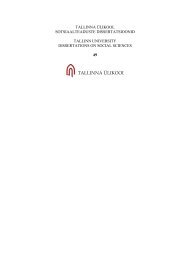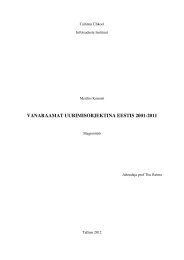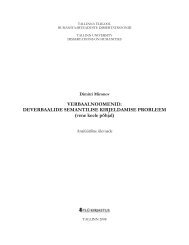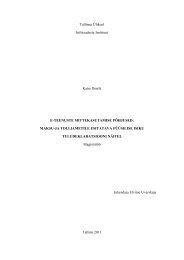Download (1157Kb) - E-Ait
Download (1157Kb) - E-Ait
Download (1157Kb) - E-Ait
You also want an ePaper? Increase the reach of your titles
YUMPU automatically turns print PDFs into web optimized ePapers that Google loves.
knowledge sharing depends much on what initiatives are taken by leaders. Once the<br />
importance of knowledge sharing is known to Tanzania public university libraries, the first<br />
step will be for them to audit the skills libraries hold. Then the second initiative will be to<br />
develop a vision on what is to be achieved then to identify the competencies needed to<br />
achieve the vision. As stated earlier in section 2.1.2 things pertaining to intellectual capital<br />
are somewhat difficult to evaluate. To assess progress, there will be a need to point out key<br />
indicators for success, see more in (Malhotra, 2000) on how this model was used in Israel.<br />
Trust has been among the issues mentioned to be critical for knowledge sharing. If<br />
knowledge sharing is to happen, then the trust environment should be available. Six of 21<br />
respondents (29%) believed that knowledge sharing is hindered by trust. They suggested that<br />
the hesitation to share is caused by the notion of hoarding for power (people want to know<br />
what you know so they can be better than you). No one stands a better chance to create the<br />
environment for trust to build in than a leader. No matter how well rewarding and<br />
compensation systems are integrated within the knowledge sharing strategy, if there is no<br />
trust, the efforts to promote sharing are wasted. Whatever is the case, studies suggest that<br />
leadership can influence how knowledge is shared both positively and negatively see for<br />
example (Cruz, Henningsen & Smith, 1999; Henningsen, Henningsen, Jakobsen, & Borton,<br />
2004; Larson, Christensen, Franz, & Abbott, 1998; Worford, Colabro, & Sims, 1975).<br />
Leaders and how they manage and what they value, their attitudes with regard to knowledge<br />
sharing will always have an implication on shaping the culture which determines how<br />
individuals will share their knowledge.<br />
“Information is power” is perhaps one of the very common slogans linked with the<br />
proliferation of networked computers. A knowledge sharing culture will start with leaders<br />
who seek information. Once leaders are connected from the world outside their own<br />
organisations, they get access to best practices in leadership and on top of that they share and<br />
receive new knowledge from different perspectives. Connection power is thus important to<br />
enable leaders to create new knowledge and share the knowledge with others. Once they<br />
know what others are doing and assess how relevant it is to their situation, they are likely to<br />
take what is useful, leave what is not useful and modify it to fit their own settings; as a result<br />
new knowledge is formed. This is an example of how leaders can be examples of knowledge<br />
creation and sharing.<br />
54

















